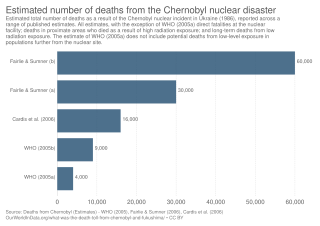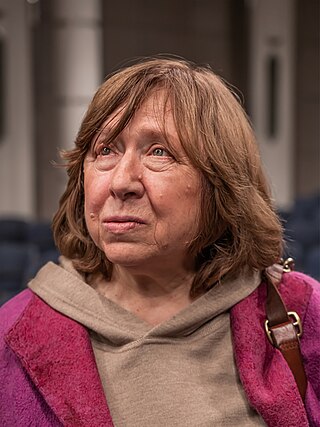
Chernobyl or Chornobyl is a partially abandoned city in the Chernobyl Exclusion Zone, situated in the Vyshhorod Raion of northern Kyiv Oblast, Ukraine. Chernobyl is about 90 kilometres (60 mi) north of Kyiv, and 160 kilometres (100 mi) southwest of the Belarusian city of Gomel. Before its evacuation, the city had about 14,000 residents. While living anywhere within the Chernobyl Exclusion Zone is technically illegal today, authorities tolerate those who choose to live within some of the less irradiated areas, and around 1,000 people live in Chernobyl today.

Pripyat, also known as Prypiat, is an abandoned city in northern Ukraine, located near the border with Belarus. Named after the nearby river, Pripyat, it was founded on 4 February 1970 as the ninth atomgrad to serve the nearby Chernobyl Nuclear Power Plant, which is located in the adjacent ghost city of Chernobyl. Pripyat was officially proclaimed a city in 1979 and had grown to a population of 49,360 by the time it was evacuated on the afternoon of 27 April 1986, one day after the Chernobyl disaster.

The Chernobyl Nuclear Power Plant Zone of Alienation is an officially designated exclusion zone around the site of the Chernobyl nuclear reactor disaster. It is also commonly known as the Chernobyl Exclusion Zone, the 30-Kilometre Zone, or The Zone.
Adi Marie Roche is an Irish activist, anti-nuclear advocate, and campaigner for peace, humanitarian aid and education.

The Chernobyl disaster began on 26 April 1986 with the explosion of the No. 4 reactor of the Chernobyl Nuclear Power Plant, near the city of Pripyat in the north of the Ukrainian SSR, close to the border with the Byelorussian SSR, in the Soviet Union. It is one of only two nuclear energy accidents rated at seven—the maximum severity—on the International Nuclear Event Scale, the other being the 2011 Fukushima nuclear accident in Japan. The initial emergency response and subsequent mitigation efforts involved more than 500,000 personnel and cost an estimated 18 billion roubles—roughly US$68 billion in 2019, adjusted for inflation. It is considered the worst nuclear disaster in history.

Chernobyl Children International (CCI) is a non-profit, international development, medical, and humanitarian organisation that works with children, families and communities that continue to be affected by the economic outcome of the 1986 Chernobyl accident. The organisation's founder and chief executive is Adi Roche. Before 2010, it was known as Chernobyl Children's Project International (CCPI).

The Association of Belarusian Guides is the Belarusian member organization of the World Association of Girl Guides and Girl Scouts (WAGGGS), with a membership of 1,274 Girl Guides.

The 1986 Chernobyl disaster triggered the release of radioactive contamination into the atmosphere in the form of both particulate and gaseous radioisotopes. As of 2022, it was the world's largest known release of radioactivity into the environment.
The Chernobyl disaster is the world's worst nuclear accident to date.

Alison Hewson is an Irish activist and businesswoman. She is married to singer and musician Paul Hewson, known as Bono, from the rock group U2.
Chernobyl Heart is a 2003 documentary film by Maryann DeLeo. The film won the Best Documentary Short Subject award at The 76th Academy Awards.
The TORCH report was a health impacts report requested by the European Greens in 2006, for the twentieth anniversary of the Chernobyl disaster, in reply to the 2006 report of the Chernobyl Forum which was criticized by some advocacy organizations opposed to nuclear energy such as Greenpeace.

Svetlana Alexandrovna Alexievich is a Belarusian investigative journalist, essayist and oral historian who writes in Russian. She was awarded the 2015 Nobel Prize in Literature "for her polyphonic writings, a monument to suffering and courage in our time". She is the first writer from Belarus to receive the award.

"Sweet People" is a song by Ukrainian singer Alyosha. It was the Ukrainian entry for the Eurovision Song Contest 2010 in Oslo, Norway. At first, a song performed by Vasyl Lazarovich was intended to represent Ukraine at Eurovision, but a new national final was held due to the broadcasting network's internal selection of Lazarovich. Alyosha won the new final with "To Be Free", but it was disqualified since it had previously been released. "Sweet People" was then chosen to represent Ukraine. The song finished tenth in the Eurovision final, receiving 108 points.
The Chernobyl disaster, considered the worst nuclear disaster in history, occurred on 26 April 1986 at the Chernobyl Nuclear Power Plant in the Ukrainian Soviet Socialist Republic, then part of the Soviet Union, now in Ukraine. From 1986 onward, the total death toll of the disaster has lacked consensus; as peer-reviewed medical journal The Lancet and other sources have noted, it remains contested. There is consensus that a total of approximately 30 people died from immediate blast trauma and acute radiation syndrome (ARS) in the seconds to months after the disaster, respectively, with 60 in total in the decades since, inclusive of later radiation induced cancer. However, there is considerable debate concerning the accurate number of projected deaths that have yet to occur due to the disaster's long-term health effects; long-term death estimates range from up to 4,000 for the most exposed people of Ukraine, Belarus, and Russia, to 16,000 cases in total for all those exposed on the entire continent of Europe, with figures as high as 60,000 when including the relatively minor effects around the globe. Such numbers are based on the heavily contested linear no-threshold model.
Alla Yaroshinskaya is a Ukrainian politician and journalist. She was a member of the Supreme Soviet from 1989 to 1991, Deputy to the Minister of Press and Information until 1993, and then Adviser to the Russian President Boris Yeltsin and member of the Russian Presidential Council. She has been a prominent campaigner for perestroika and for better aid and information following the Chernobyl disaster. She was President of the Ecological Charity Fund, and is Co-chair of the Russian Ecological Congress, Chief of the Federal Council of the all-Russian Social Democratic Movement and a member of other international committees. She is author or co-author of over 20 books and over 700 articles on freedom of speech, human rights, nuclear ecology and nuclear security.

The Polesie State Radioecological Reserve is a radioecological nature reserve in the Polesie region of Belarus, which was created to enclose the territory of Belarus most affected by radioactive fallout from the Chernobyl disaster. The reserve adjoins the Chernobyl Exclusion Zone in Ukraine. The environmental monitoring and countermeasure agency, Bellesrad, oversees the agriculture and forestry in the area.

Galina Ackerman or usually Galia Ackerman is a French-Russian writer, historian, journalist, translator, researcher at the University of Caen, specializing on Ukraine and Post-Soviet states. She was also a translator for slain Russian journalist Anna Politkovskaya.
Victoria Markovna Ivleva-York is a Russian photographer and political activist. In 1992 she was awarded the World Press Photo of the Year award in the Science & Technology category for her series of photographs taken on 1 January 1991 of the Chernobyl plant. She prefers to take photographs in black-and-white.














